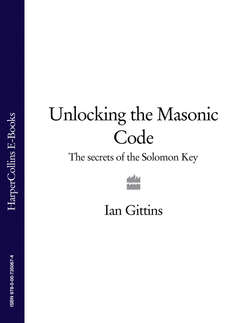Читать книгу Unlocking the Masonic Code: The Secrets of the Solomon Key - Ian Gittins - Страница 20
The Schaw Statutes
ОглавлениеIn 1598, William Schaw, the Master of Works for Scottish ruler (and suspected Mason) King James VI, passed two statutes seeking clearly to define the nature of Freemasonry. The decrees stated the responsibilities and duties of lodge members and set out the punishments for unsatisfactory work and employing non-initiated Masons. They also required all lodges to keep minutes of every meeting, and obliged them to submit their members to tests of their knowledge of Masonic history and law.
life. These progressive thinkers were greatly impressed with Freemasonry’s stringent moral code and search for self-betterment: to use Masonry’s language, the way that members sought to turn themselves into beings as sturdy, worthy and inspiring as a cathedral.
The traditional operative Freemasons who worked daily with stone and gauge were thus joined in the lodges by a new wave of speculative Masons who had never wielded a chisel in their life. Some traditionalist members opposed the move, afraid that these newcomers would see no reason to keep their zealously guarded trade secrets. A few lodges even burned all written records. Yet before long such accepted or admitted Masons were accepted within the fraternity by all but the most reactionary stonecutters.
Freemasonry thus proudly took its place in the vanguard of progressive thought, alongside institutions such as the recently-formed Royal Society of London, a scientific thinking-shop: many illustrious figures such as Sir Christopher Wren and Elias Ashmole joined both organizations. Yet even amongst the hard intellectual rigour of the age, it is easy to believe such elevated men of reason must have enjoyed a private, boyish frisson at the arcane rituals and elaborate secrecy required to become a speculative Mason.
Dan Brown could be forgiven for latching eagerly onto the speculative Freemasons of the mid-seventeenth century as a plot device. Here, after all, was a covert conglomeration of the age’s greatest and most renowned free thinkers, operating within a ritualistic secret society—who knows what perfidious plots they could have been hatching?
However, such speculation appears largely misplaced. There is no evidence that the Freemasons’ lodges of this era were bent upon anything more than speculative contemplation of a fast-changing world, combined with a rigorous moral code. Members at this time still professed allegiance to God rather than a nebulous Supreme Being: their sole ‘crime’ in reactionary eyes was also to embrace the new-fangled Renaissance cult of rationalism.
Operative Masons’ fortunes also received a spectacular boost in the middle of the century. The Great Fire of London of 1666 razed 40,000 dwellings to the ground and close to 100 churches in the capital. As architects and builders flocked to London, the number of Masons’ lodges in the city rocketed accordingly. Yet this proved a short-lived gain, and by the start of the eighteenth century there were a mere six Masonic lodges in London. Other lodges were scattered across the country in an ad hoc, disjointed manner, and even within these fraternal chapters, observation of Masonic rituals and symbolism was declining. Freemasonry clearly needed to organize or it would die.
